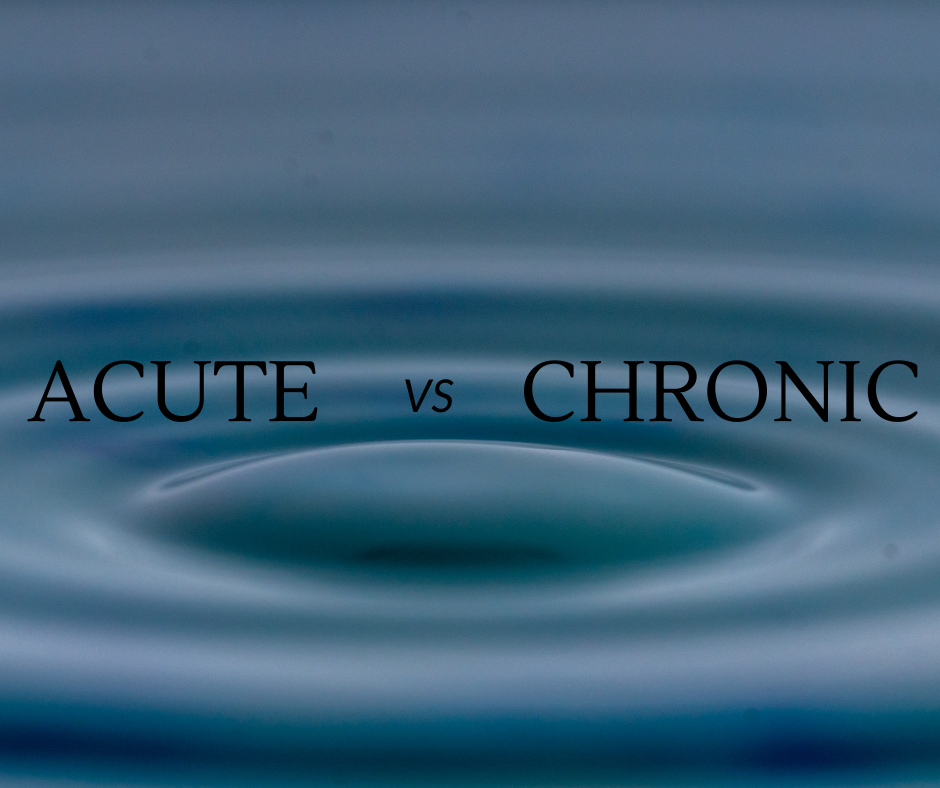
With homeopathy it is important to be able to differentiate between acute illness and chronic illness. This will help you determine if your situation is something you can safely and successfully treat at home, or if it is something more complex that requires the help of a professional homeopath.
Why do I need to know the difference?
Homeopathy is a very effective form of treatment, but it is only as effective as it is utilized. Homeopathy has specific laws that must be followed. When these laws are not followed correctly either homeopathy will not work, or the person may experience an undesirable effect like a worsening of symptoms, or new symptoms appearing. This is not as much of an issue if we are treating minor acute illness, which are self limiting and not very deep seated. But, if you were to try and prescribe for deep seated chronic issues and do so incorrectly, you may experience a worsening of symptoms, and if you continued to take that incorrectly prescribed remedy for a long period of time, that aggravation may become a real problem that could become difficult to treat.
What is an Acute Illness?
An acute illness is an illness that is self limiting, meaning it will usually resolve with time, and usually on its own. These would be minor injuries, viral infections, minor bacterial infections, and recent emotional traumas in their early acute state. These issues you will probably have good success with treating yourself at home with a good homeopathy book and a homeopathy kit. If you are seeing a homeopath, please do check with your homeopath first.
Recurrent, relapsing, or prolonged acute infections will need to be treated by a homeopath to completely resolve. Usually this shows an underlying chronic weakness that needs to be addressed to fully restore health.
What is a Chronic Illness?
Chronic illness is a set of symptoms a person has been experiencing for some time. They are ongoing and they do not usually resolve on their own. They are usually complex and affect multiple systems of the body: mental, emotional, organs, and/or endocrine. An example would be something like diabetes, diabetes does not just involve the pancreas, but multiple organs and systems of the body. Or eczema, which may seem very superficial and not very complex, when the reality is many systems are at play with eczema: skin, gut, immune system, possibly the lungs, mental and emotional from stress or self consciousness, and possibly endocrine due to stress and sleeplessness, which many times accompanies eczema.
Why can’t I just treat it myself?
Homeopaths have extensive training in the science of homeopathy. Most Classical Homeopathy training courses are 4 years in duration, and that is just the foundational part of their training. They study anatomy, physiology, pathology, nutrition, along with their homeopathic studies on materia medica, case taking, miasms, and so much more.
They study how past issues of the patient, and past issues within the patient’s family, may be contributing to what the patient is currently experiencing. They are trained on how to recognize this and how to up root it to restore health with homeopathy.
They are trained how to find the one remedy, out of thousands, that fits the uniqueness of your situation, past and present. They are trained in case management, handling aggravations, recognizing suppression, recognizing incorrect prescriptions, potency, dosing, recognizing when a remedy needs to be changed, knowing what is a healing response and what may seem like healing, but may actually not be, and may actually be leading to a deeper level of illness.
You see there is so much more to homeopathy than “what is the remedy for xyz illness?” Now that you are able to differentiate between an acute and chronic illness, you will be able to determine what you can safely and successfully treat at home and when you need to get professional help.
This website does not provide medical advice. It is intended for informational purposes only. It is not a substitute for professional medical advice, diagnosis or treatment. Never disregard professional medical advice or delay in seeking it because of something you have read on this website. If you think you may have a medical emergency, immediately call your doctor, or dial 911, or go to your nearest emergency room.

